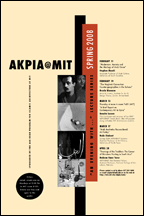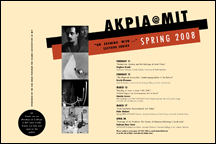Lectures, Conferences & Events» Past Lectures & Events
Ursula Biemann
"The Maghreb Connection: Counter-geographies in the Sahara"
Abstract
Since the fortification of the European outer rim and the pressure on Maghreb countries to stem migration flows from the South, the Sahara basin has become a contested zone of mobility. We witness a large-scale geographic reconfiguration activated by the growing and highly flexible practices of migration, proficient at rerouting, reorganizing or going covert in record time. Diverting the attention from the present fascination with power geographies and repressive border regimes, The Maghreb Connection (2005-2007), a collaborative research and exhibition project based in Cairo, explores the counter-geographies constituted by clandestine operating systems, innovative practices of resistance and migratory self-determination. The second part of the presentation introduces Biemann's Sahara Chronicle, a video collection on the post-colonial entanglement underlying the present sub-Saharan exodus towards Europe.
Biography
Ursula Biemann is an artist, theorist and curator based in Zurich. She studied in New York at the School of Visual Arts (BFA) and at the Whitney ISP. Biemann has in recent years produced a considerable body of work on migration, mobility, technology and gender. In a series of widely exhibited video essays, as well as in several books – 'Geography and the Politics of Mobility' (2003), 'Stuff It – the Video Essay in the Digital Age' (2003), and her new monograph 'Geobodies' (Actar, 2008) – she has focused on migrant labour: from smuggling on the Spanish-Moroccan border to women in the global sex industry. Recent multi-channel videos include 'Black Sea Files' on the Caspian oil geography and 'Sahara Chronicle'. Ursula Biemann is a Researcher at the Institute for Art and Design Theory in Zurich.
Nada Shabout
"Arab Aesthetics Reconsidered: Art Today"
Biography
Nada Shabout was trained in architecture at the New York Institute of Technology, the University of Texas at Arlington and the Architectural Association School of Architecture , London, England. She has also earned BFA fine arts, MA and PhD in the Humanities with a concentration in art history and criticism from the University of Texas at Arlington, 1999. She wrote her dissertation on "Modern Arab Art and the Metamorphosis of the Arabic Letter." A book based on her dissertation "Modern Arab Art: Formation of Arab Aesthetics," was published by the University of Florida Press, 2007. She has been an Assistant Professor of Art History at the University of North Texas since 2002, teaching Arab visual culture and Islamic art. She has been working on the documentation of modern Iraqi heritage, particularly the collection previously held at the Iraqi Museum of Modern Art since her visit to Baghdad in June 2003. She has been organizing panels and presenting around the world on the state of Iraq's modern heritage following 2003, the relationship of identity and visual representations in modern and contemporary Iraqi art, and exhibitions of Middle Eastern arts in the West since 911.
Among her honors is The American Academic Research Institute in Iraq ( TAARII) fellowship 2006, 2007; and Fulbright Senior Scholar Program, 2007 Lecture/Research fellowship to Jordan Project, " Arab Art Now: A Study of the Contemporary Art Vision in Jordan." She is a founding member and first president (2007-2009) of the Association for Modern and Contemporary Art of the Arab world, Iran, and Turkey (AMCA).
She is the curator of the traveling exhibition "Dafatir: Contemporary Iraqi Book Art," 2005-07; and "Moments from 20th Century Iraqi Art," at t he Montalvo Art Center , California, 2007- 2008 . She has edited the exhibition catalogue "Dafatir: Contemporary Iraqi Book Art (UNT Art Gallery, 2007).
She is the author several articles that examine legal and ethical responsibilities of the US in Iraq after 2003, including, "The Iraqi Museum of Modern Art: Ethical Implications," Collections ( Vol. 2, no. 4, May, AltaMira Press , 2006 ); "Historiographic Invisibilities: The Case of Contemporary Iraqi Art," the International Journal of the Humanities (volume 3, Number 9, 2006); "The "Free" Art of Occupation: Images for a "New" Iraq," Arab Studies Quarterly (Volume 28, Number 3 and 4 Summer and Fall 2006); and "Preservation of Iraqi Modern Heritage in the Aftermath of the US Invasion of 2003," in Gail Levin and Elaine A. King, eds, An anthology on Ethics in the Art World (Allworth Press, 2006).
Nadeem Omar Tarar
"Framings of the Tradition: The Career of Miniature Painting in South Asia"
Abstract
In the contemporary curatorial practices and art historical discourses, miniature painting has been variously invoked as Persian miniature, Mughal painting, Indo-Persian painting, Rajput painting and Pahari painting, to cite a few prefix, pointing to its courtly origin as well as a specific form, iconography and technique of execution. In the course of its institutional career in South Asia, from its eminence in the Mughal court as the imperial art of book illustration to its fall as a handicraft in British colonial period; its appropriation by Indian nationalist intelligentsia in search of distinct modern cultural identity to its national resurrection in the post-independence period as the traditional fine art of Pakistani Islamic republic to its post-modern reinvention as contemporary art practice, which is, – to use Homi Bhabha's words, 'the re-evaluation of tradition to the extent that tradition is no longer opposed to modernity'- offers penetrating clues to the taxonomic shifts that have taken place in the construction of Indian painting in the past five hundred years.
Biography
Nadeem Omar Tarar is an Assistant Professor at the Department of Communication and Cultural Studies, National College of Arts, Lahore. He holds a PhD in Art History and Theory, from the University of New South Wales Sydeny, Australia and a MA in Critical Theory and Cultural Studies from the University of Nottingham, UK. He has also been affiliated with School of Oriental and African Studies, University of London as a Post-doctoral Researcher. Currently, he is a Post-doctoral Fellow at the Aga Khan Program for Islamic Architecture, MIT, USA.
He has co-edited and introduced the book "Official" Chronicle of the Mayo School of Arts, the Formative Years under John Lockwood Kipling, 1875-1883 (Lahore, 2002). He is author of Anthropology in Pakistan: the State of Discipline in State of Social Sciences in Pakistan , (Islamabad, 2005). He has also published in Economic and Political Weekly , International Journal of Art and Design Education , and Journal of Germanic Mythology and Folklore. His forthcoming publications include a book on From Primitive Artisans to Modern Artists: Colonialism and Art Education in Punjab.
Stephen Sheehi
"Modernism, Anxiety and the Ideology of Arab Vision"
Abstract
The beginning of the 20th century in the Arab world witnessed the appearance of a radically new, even scandalous literary clique, the Romantics, themselves romanticized and valorized in the tradition of Arabism as revolutionary free thinkers. This presentation examines the rather odd, if not vituperative, reception of Modernist painting by Arab Romantics, particularly Amin Rihani and Khalil Jubran (Gibran). Their reaction, we will see, was not coincidental or sentimental but rooted in an ideology of Arab progress and subjectivity, which they challenged but could not escape in the shadow of European imperialism.

